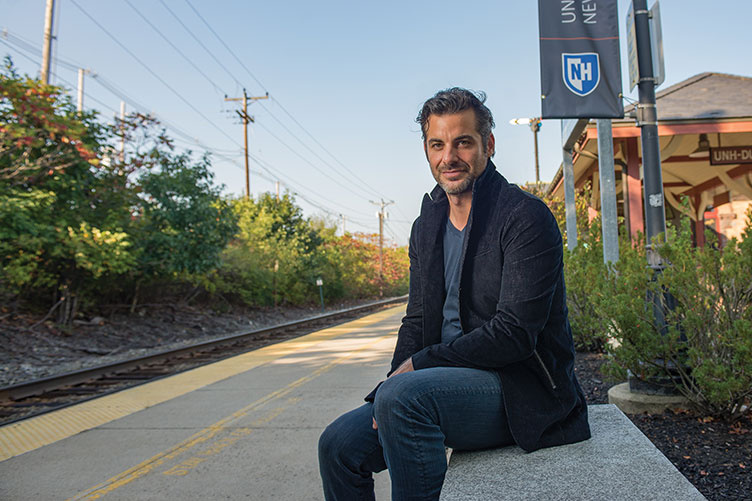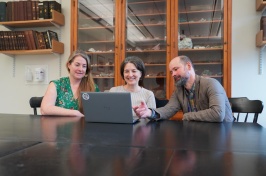
It was 1995, the summer after his freshman year at UNH, when Jim Curtis ’99 woke up with numbness in his left foot. In the shower, he realized he couldn’t feel either the heat of the water on his foot or the sensation of the water itself, but after a few cursory attempts at rousing the sluggish limb, he quickly pushed his incipient worry aside: he’d been riding his bicycle on the beach the night before and fallen headfirst into the sand; possibly he’d pinched a nerve in his neck. It wasn’t until a month later, when the numbness reached his thigh and he started having migraines, that he mentioned his symptoms to his mother, an emergency room nurse; and it wasn’t until a hastily arranged MRI revealed lesions on his spinal cord that Curtis confronted the gravity of his situation. “That was the point at which my story changed from frat guy-athlete to something else,” he says.
“The most important thing I talk about is having a flexible mind. That’s something I learned from professor Rosenfield.”
Curtis had come to UNH as a swimming recruit, a nationally ranked freestyle sprinter. Within months of his first symptoms, he was experiencing debilitating pain and was rapidly losing the use of his right leg. In search of treatment, he took a leave of absence, and while none of the medical professionals he and his family consulted — neurologists at top hospitals from the Mayo Clinic to Johns Hopkins — could offer a diagnosis, they eventually succeeded in getting Curtis’ progressive symptoms well enough controlled that he could resume his college education. He returned to UNH fitted with a PICC line — a catheter that ran from a vein in his arm to the top of his heart, delivering powerful medications to his bloodstream — and got around campus by motorcycle. He also tried to remember what he’d learned from communications professor Larry Rosenfield, one of the few people with whom he’d shared the extent of his health issues.
“Before I left, he told me everything was going to work out okay, and he said it in a way that had a profound impact on me,” Curtis recalls. “He taught me to meditate and introduced me to the idea of mindfulness: focusing on just being present.”
Rosenfield ultimately became one of what Curtis would come to call his Stimulati: “thought igniters” and healers who helped him find meaning in his illness and new mindsets that made his life more fulfilling. “For much of my life, I let my stories, specifically the ones around my illness and my sense of self, create my reality,” Curtis says. “When I finally got clear after practicing the lessons of the Stimulati, I could see what I was creating and chose to create a new story.”
After UNH, Curtis’ story included a stint on Wall Street working as a trader on the American Stock Exchange, and a career in healthcare-focused digital media (among other companies, Curtis spent seven years at a then-new WebMD). It’s also involved some literal storytelling. Since 2012, he’s been an executive at Remedy Health Media, an internet company dedicated to helping patients thrive in the face of illness that sees some 20 million visitors each month. Now the company’s president, he travels the country as a public speaker, sharing his own health journey. Earlier this year he published The Stimulati Experience about the same.
“The most important thing I talk about is having a flexible mind,” he says. “That’s something I learned from professor Rosenfield.”
Rosenfield passed away in 2011, but Curtis returned to Durham recently to share some of his UNH Stimulati’s wisdom with the next generation of Wildcats. In a Horton Hall classroom on an unseasonably warm September afternoon, he led several groups of students through the same meditation exercises Rosenfield taught him and his classmates two decades earlier, after which he had students pair up, stare into each other’s eyes — and scream as loud as they could.
“It was awesomely awkward,” he says with a laugh. “But I overheard one girl say, ‘This is just what I needed today.’ And that makes it all worthwhile.”
Originally published in UNH Magazine Winter 2018 Issue
-
Written By:
Kristin Waterfield Duisberg | Communications and Public Affairs





















































